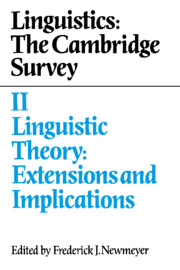Book contents
- Frontmatter
- Contents
- Contributors
- Preface
- 1 Extensions and implications of linguistic theory: an overview
- 2 Grammar and language processing
- 3 Grammatical principles of first language acquisition: theory and evidence
- 4 Second language acquisition and grammatical theory
- 5 Brain structures and linguistic capacity
- 6 Abnormal language acquisition and the modularity of language
- 7 Grammatical aspects of speech errors
- 8 Grammar and conversational principles
- 9 Discourse analysis: a part of the study of linguistic competence
- 10 Speech act distinctions in grammar
- 11 Computer applications of linguistic theory
- 12 Metrics and phonological theory
- 13 Grammatical theory and signed languages
- 14 The linguistic status of creole languages: two perspectives
- 14.I Creole languages and the bioprogram
- 14.II Are creoles a special type of language?
- 14.III A dialog concerning the linguistic status of creole languages
- Subject index
- Name index
- Contents of volumes I, III, and IV
6 - Abnormal language acquisition and the modularity of language
Published online by Cambridge University Press: 08 February 2010
- Frontmatter
- Contents
- Contributors
- Preface
- 1 Extensions and implications of linguistic theory: an overview
- 2 Grammar and language processing
- 3 Grammatical principles of first language acquisition: theory and evidence
- 4 Second language acquisition and grammatical theory
- 5 Brain structures and linguistic capacity
- 6 Abnormal language acquisition and the modularity of language
- 7 Grammatical aspects of speech errors
- 8 Grammar and conversational principles
- 9 Discourse analysis: a part of the study of linguistic competence
- 10 Speech act distinctions in grammar
- 11 Computer applications of linguistic theory
- 12 Metrics and phonological theory
- 13 Grammatical theory and signed languages
- 14 The linguistic status of creole languages: two perspectives
- 14.I Creole languages and the bioprogram
- 14.II Are creoles a special type of language?
- 14.III A dialog concerning the linguistic status of creole languages
- Subject index
- Name index
- Contents of volumes I, III, and IV
Summary
Introduction
My daughter, Rebecca, was not an early talker. Over a long period of time she produced many delightful monologues of gibberish which, by the time she was close to two years of age, had evolved into soliloquies of gibberish combined with English words. ‘When, oh when, will she start to acquire the grammar?’ I wondered (sometimes aloud). ‘Only a linguist would care about her grammar’, family and friends would say with some disdain. They were probably right. Many, if not most, linguists are concerned with characterizing and accounting for the grammar, as opposed to other aspects of language. Linguists are frequently called to task for having this narrow focus, rather than considering and studying language in its broader context.
Some theories of language acquisition reflect similar biases against the validity of focussing exclusively on grammar. The concurrent development of motor, social, cognitive, and linguistic abilities in the normal child is a fact which no doubt has influenced several theories of language development (e.g. social interaction theories: Bruner 1977; Bruner & Ninio 1978; Ratner & Bruner 1978; cognitive theories: Macnamara 1972,1977; Lock 1978; Bates et al. 1979; Piaget 1980) to stress the interconnections between acquisition of the grammar and other areas of development. Such theories entail that nonspecific learning mechanisms underlie the changes that occur with increasing age across domains of knowledge. A linguistic theory of language acquisition, in contrast, has as its goal and single focus, an adequate account of the acquisition of steady state grammars.
- Type
- Chapter
- Information
- Linguistics: The Cambridge Survey , pp. 96 - 116Publisher: Cambridge University PressPrint publication year: 1988
- 21
- Cited by

